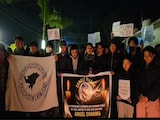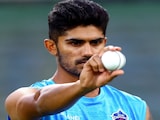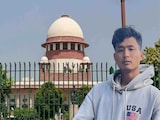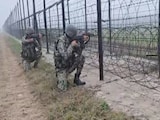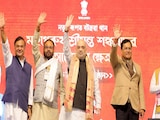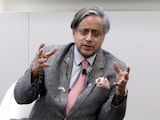Freedom. As much as this word brings joy across generations, the trauma has been equal when it came to Partition horrors. The wait for the end of colonial rule saw Bengal and Punjab go up in flames and engulfed in communal riots. Refusing to accept the aggressive agenda of the Muslim League to bring Calcutta into Pakistan, a fierce man from a city-based meat-selling Brahmin family, rose to the occasion in 1946.
His story assumes significance today, seven decades after Independence, with his legacy remaining unclaimed, and due to what his family believes is an attempt to distort his ideology by a filmmaker.
Who Was Gopal Patha?
Gopal Chandra Mukherjee, or Gopal Patha, was born in Kolkata in 1913. 'Patha' means goat in Bengali, a reference to his family-run meat shop on College Street. He is often referred to as the man who saved Calcutta from falling to the Muslim League. But over seven decades after Independence, he still needs an introduction.
Just five feet and four inches tall, Mukherjee chose a herculean task for himself. His long hair tied neatly, complete with a beard and moustache, he sported a gentlemanly look. But the police knew him as a criminal, a gang leader who had hundreds of boys ready to kill at his command. His muscle power kept the cops on their toes.
Mukherjee's role in Calcutta's history rose to prominence much ahead of the Partition. He met with force the Muslim League's agenda to snatch Calcutta by force. Armed with sticks, spears, knives, guns, or whatever his men could arrange, he led an army that stood like a wall against surrendering the city.
Direct Action Day
By the beginning of the 1940s, most freedom leaders in united India were convinced that the two-nation theory was inevitable - a political doctrine preached by the Muslim League and Muhammad Ali Jinnah. But the drawing of a map that would divide a country known for its united struggle against the British had become a point of communal discord.
The Muslim League was worried about the demographics of their dream nation that came with an economic challenge. While the eastern part of then Bengal province was Muslim-majority, it lacked industrial hubs, which were concentrated in cities like Calcutta and Howrah, on the western side.
The League then came up with a plan that left the region burning. Jinnah announced 'Direct Action Day' on August 16, 1946, to ensure Calcutta fell to the League by a show of muscle power. The day marked the beginning of violent events, with fiery speeches being given from local mosques at the instruction of Huseyn Shaheed Suhrawardy, a League leader who then held the post of Bengal's Prime Minister.
Hindu houses were burnt and shops looted by Muslim League supporters. There were killings and rapes.
By August 17th, Hindus started organising. Gopal Mukherjee was among the musclemen who mobilised their forces. The Vyayam Samitis, who were instrumental in the freedom struggle, chipped in, armed with rods, knives, and even revolvers that they had sourced from American soldiers in the aftermath of World War 2. Funding for counteroffensive poured in from the Marwari traders of Burrabazar.
Mukherjee, fearing that Calcutta would turn into Pakistan, gave strict orders to his men to retaliate. In response to one murder, you kill 10 of the attackers, he told them.
After two more days of violence, the League realised Mukherjee couldn't be countered and that bringing Calcutta into Pakistan would remain a distant dream.
In an article for The Indian Express, British historian and journalist Andrew Whitehead illustrated Mukherjee's role as, "Calcutta was in flames and Gopal Patha, in effect, took the opportunity to douse the city in kerosene." But for Mukherjee, it was his "duty to help those in distress".
A year after the killings started, in 1947, Mahatma Gandhi visited Calcutta. Many turned up to his message of peace and laid down their weapons. But Mukherjee was adamant. "Where was Gandhiji, I said, during the Great Calcutta Killing?" he had recalled, refusing to surrender even a nail.
Was He Anti-Muslim?
Mukherjee's role in the partition violence has been controversial; over the years, he has been billed as a "protector of Hindus", but his family refuses to believe in the communal binary that it made him a "Muslim-hater". Rather, he saved several Muslim families in his neighbourhood during the 1946 riots, recalls his grandson Santanu Mukherjee.
Speaking to The Times of India, he claimed his grandfather sheltered Muslims on their house terrace. He even saved the family of a rickshaw-puller whom they knew as Rafique chacha, his sister recalled, adding that local Muslims still respect their family.
But his family fears his portrayal in the upcoming movie 'The Bengal Files' reduces him to "a rabble-rousing Muslim-hating butcher". Santanu Mukherjee, who still lives in his 200-year-old ancestral home that was once the address of Gopal Patha, is now leading a pushback to the movie by filmmaker Vivek Ranjan Agnihotri that had led to an uproar over alleged distortion of history.
In a police complaint, he has alleged the movie "denigrates not only his (grandfather's) words or deeds, but his ideological conviction along with historic struggle."
Not just his family, even in his own words, Gopal Mukherjee made his conviction clear: the aim was to save the city, not meaningless killing.
In a 1997 interview, Whitehead had asked him if his boys misbehaved with any Muslim woman if they found her alone. He had replied softly, but firmly, that there were strict orders not to touch any women.
"I had strict orders not to misbehave with or kill women, even if they were Muslims. In our history, even Ravan was destroyed for kidnapping Sita. Therefore, I had given two strict orders: do not loot and do not misbehave with women," he had said.
Mukherjee died in 2005.


